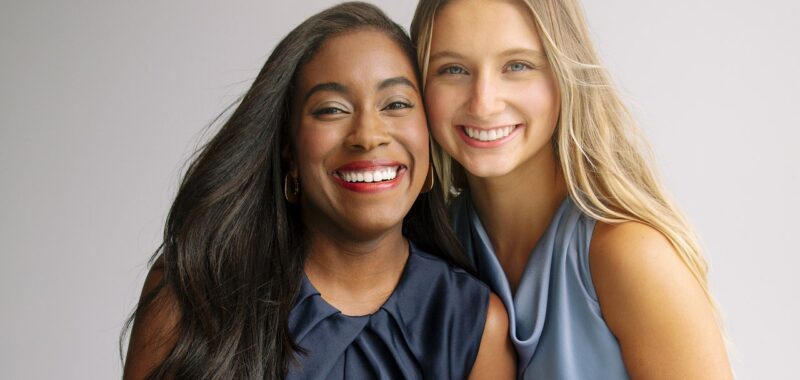“I can’t imagine not having a choice, but today that’s the reality for many women and girls across the country because of Donald Trump’s abortion bans,” Hadley, now 22, told the gathered crowd and the country watching at home. “He calls it a beautiful thing. What is so beautiful about a child having to carry her parent’s child?”
Both women are now, in many ways, full-time reproductive justice advocates. Spurred by their anger, pain, and hope, they have put their lives on pause to work toward one goal: restoring abortion rights for women in the US. Their DNC appearance was just the tip of the iceberg. Both are working as surrogates for the Harris-Walz campaign, traveling all over the country to tell their stories and meet with potential voters, trying to convince them to join the fight. They’ve appeared in national campaign ads; they speak to crowds large and small. During the fall they’ll be appearing across battleground states as part of the campaign’s Fighting for Reproductive Freedom bus tour.
It hasn’t been easy. At times it’s been really hard. The two women have juggled schedules and personal commitments, the slog of endless, constant travel, and the toll that this can take on a body. They have faced backlash from Republican politicians, friends, family, and even strangers they see out in their communities. And then, of course, there are the endless online hate comments, telling them to die, that they are baby killers, that they deserve to burn in hell.
Why put themselves through this? Well, both Hadley and Kaitlyn say, it’s ultimately not about them. It’s about correcting an injustice, about fighting for a cause that they both feel so empowered by—so deeply spurred to fight for—that sitting and doing nothing feels impossible. To rise from the person they were as they bled in their bathroom and channel that pain, that rage, to ensure no other woman or girl will have to suffer too.
When she thinks about why she does this, Kaitlyn thinks about a little girl, her daughter.
“I’m hoping in a hundred years she or her grandchildren or great-grandchildren are not dealing with anything remotely close to what we’re dealing with right now,” she says.
Hadley thinks about another little girl, her younger self.
“It’s really transformed my life,” she says of her activism. “It has allowed so many conversations to be started and had, and honestly that is so special. It is so amazing to be able to stand up on a platform and give voice to a younger me, who felt like she was always trying to scream and was never heard. And to give a voice to so many who are currently going through that.”
Kaitlyn’s life currently, like the lives of many working mothers, is a balance. After all, she’s juggling a lot. Even before all this, Kaitlyn and Landon’s world was one of schedules, of family pitching in to babysit, of arranging every day into a delicate dance so everything could get done. But then she miscarried.
After the miscarriage and the resulting trauma, Kaitlyn sunk into a low she was having trouble climbing out of. She felt depressed, bitter, enraged. She would sit around thinking about how badly she had been treated and that there were probably so many other women in Louisiana out there, right now, being traumatized in the same way. How was it right? How was it fair?
Then, a month after her miscarriage, her twin sister called her. She’s a physician, and she told Kaitlyn there was going to be a Louisiana Department of Health meeting at which members of the public could speak about the abortion ban.
“She was like, ‘You need to take your butt down there and say something,’” says Kaitlyn. “And I was like, ‘I’m not going to do that.’”
But her sister—lovingly, of course—wouldn’t stop nagging her about it, and finally Kaitlyn agreed. She went to the meeting, where she told her story publicly for the first time.
“I talked about how I love this state, but the state doesn’t love me back,” she says. For a woman whose Louisiana roots run deep, whose own daughter was growing up among her big extended family on both sides in Baton Rouge just as Kaitlyn herself had, that realization had felt painful and profound.
After she told her story, a woman approached her. It was a journalist who asked if she could interview Kaitlyn for an NPR story. Kaitlyn immediately thought no but went home and talked to Landon about it.

